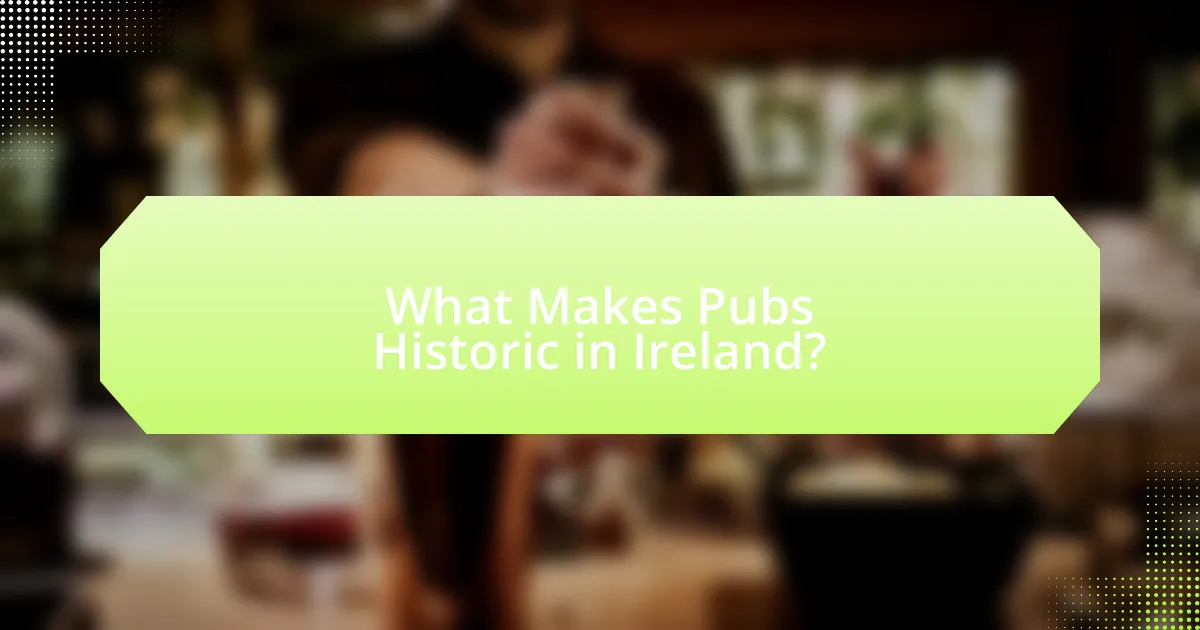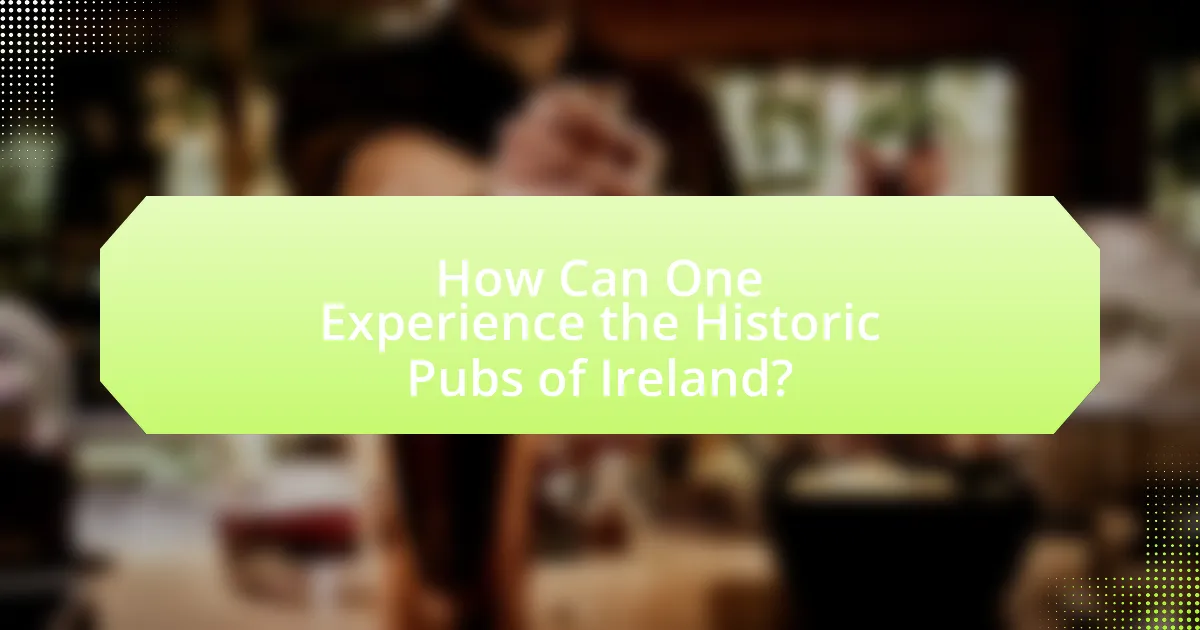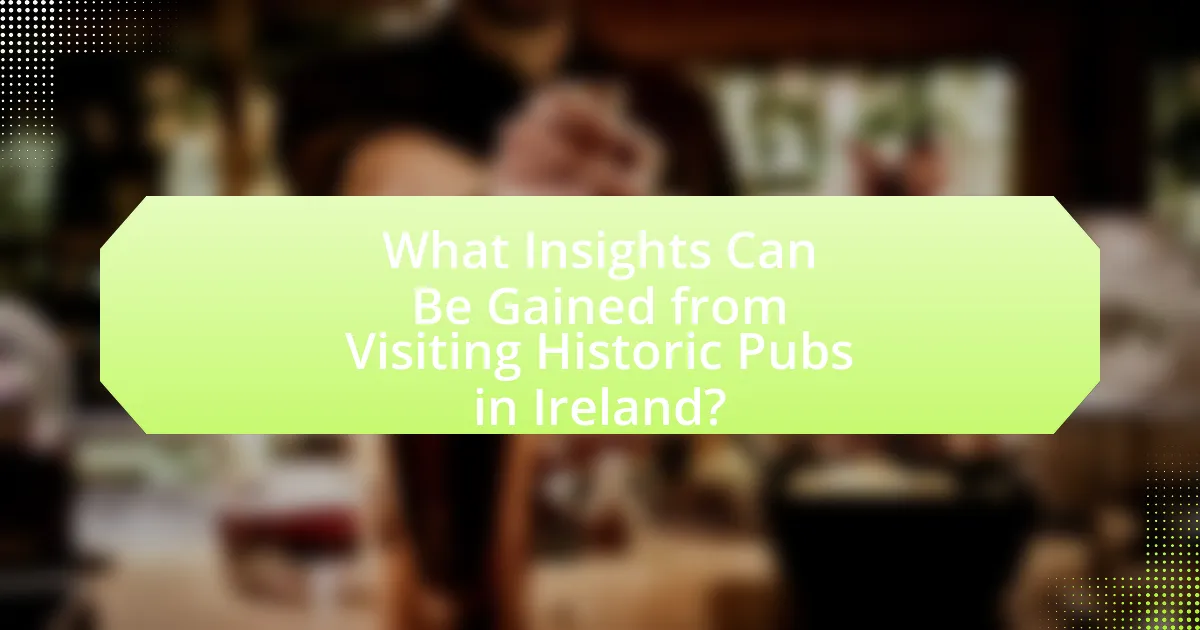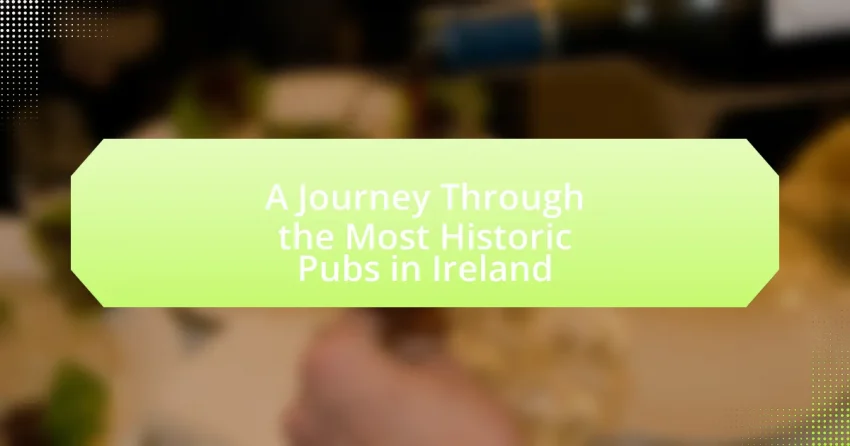The article focuses on the historic pubs of Ireland, highlighting their cultural significance, architectural heritage, and roles in social and political history. It defines a historic pub as one that has been operational for over a century and possesses notable cultural or architectural importance. Key criteria for classification include age, historical associations, and community relevance. The article also explores the contributions of these pubs to local traditions, their reflections of Irish history, and notable examples such as The Brazen Head and Sean’s Bar. Additionally, it provides insights on how visitors can experience and appreciate the rich heritage of these establishments.

What Makes Pubs Historic in Ireland?
Pubs in Ireland are considered historic due to their long-standing cultural significance, architectural heritage, and role in social and political history. Many Irish pubs date back several centuries, with some established as early as the 12th century, serving as community hubs where locals gather for social interaction, storytelling, and music. For instance, The Brazen Head in Dublin, established in 1198, is recognized as Ireland’s oldest pub and has hosted notable figures throughout history, including James Joyce and Michael Collins. Additionally, pubs often feature traditional Irish decor and craftsmanship, reflecting the local heritage and craftsmanship of the time. This combination of age, cultural relevance, and architectural significance contributes to the historic status of pubs in Ireland.
How do we define a historic pub in Ireland?
A historic pub in Ireland is defined as an establishment that has been in operation for a significant period, typically over a century, and possesses cultural, architectural, or social importance. These pubs often feature traditional Irish decor, original furnishings, and a rich history that reflects local heritage, such as being frequented by notable figures or serving as community gathering spots. For example, the Brazen Head in Dublin, established in 1198, is recognized as Ireland’s oldest pub, showcasing the historical significance attributed to such venues.
What criteria are used to classify a pub as historic?
A pub is classified as historic based on criteria such as its age, architectural significance, historical associations, and cultural importance. Specifically, a pub may be deemed historic if it has been in operation for a significant period, often over 100 years, and features original architectural elements that reflect the style of its era. Additionally, if the pub has connections to notable historical events or figures, or if it serves as a cultural hub within the community, these factors contribute to its classification as historic. For example, many historic pubs in Ireland are recognized for their role in social gatherings and local traditions, further solidifying their status.
Why is the history of a pub significant to its identity?
The history of a pub is significant to its identity because it shapes the establishment’s character, community ties, and cultural heritage. Historical events, such as local gatherings, celebrations, or even notable visits by famous figures, contribute to the narrative that patrons associate with the pub. For instance, pubs that have been in operation for centuries often reflect the evolution of societal norms and local traditions, making them landmarks of cultural significance. Additionally, the architectural style and decor of historic pubs often tell stories of the past, further embedding them into the local identity. This connection to history fosters a sense of belonging among patrons, reinforcing the pub’s role as a social hub within the community.
What role do historic pubs play in Irish culture?
Historic pubs serve as vital social hubs in Irish culture, fostering community interaction and preserving local traditions. These establishments often act as gathering places where people share stories, music, and cultural heritage, reflecting the rich history of Ireland. For instance, many historic pubs date back several centuries and are often associated with significant events in Irish history, such as the 1916 Easter Rising, where pubs became meeting points for revolutionaries. Additionally, the presence of traditional Irish music sessions in these pubs helps to sustain and promote Ireland’s musical heritage, making them essential to the cultural landscape.
How do historic pubs contribute to local traditions?
Historic pubs contribute to local traditions by serving as communal gathering spaces that foster social interaction and cultural exchange. These establishments often host traditional music sessions, storytelling events, and local celebrations, which help preserve and promote regional customs. For example, many historic pubs in Ireland, such as The Brazen Head in Dublin, have been in operation since the 12th century and are known for their role in maintaining Irish music and folklore. This continuity not only reinforces community identity but also attracts tourism, further embedding these pubs into the cultural fabric of their locales.
What stories do historic pubs tell about Ireland’s past?
Historic pubs in Ireland tell stories of social, political, and cultural significance throughout the country’s history. These establishments often served as gathering places for communities, where locals discussed events such as the struggle for independence and the Great Famine. For instance, the Brazen Head in Dublin, established in 1198, is known for its association with historical figures like James Joyce and has witnessed pivotal moments in Irish history. Additionally, pubs like the Long Hall reflect the architectural styles and social customs of their respective eras, showcasing the evolution of Irish society. Through their rich histories, these pubs encapsulate the resilience and spirit of the Irish people.
What are some notable historic pubs in Ireland?
Some notable historic pubs in Ireland include The Brazen Head in Dublin, which dates back to 1198, making it one of the oldest pubs in the country. Another significant establishment is Sean’s Bar in Athlone, recognized as Ireland’s oldest pub, with origins tracing back to 900 AD. The Long Hall, also in Dublin, has been serving patrons since the late 19th century and is renowned for its Victorian decor. Additionally, The Crown Liquor Saloon in Belfast, established in 1885, is famous for its ornate interior and historical significance. These pubs not only offer a glimpse into Ireland’s rich drinking culture but also serve as landmarks of the country’s history.
Which pubs are recognized for their historical significance?
The pubs recognized for their historical significance in Ireland include The Brazen Head, which dates back to 1198 and is known as Dublin’s oldest pub, and The Long Hall, established in 1766, famous for its Victorian decor and cultural heritage. Additionally, The Stag’s Head, built in the 18th century, is noted for its traditional Irish atmosphere and historical connections to Dublin’s literary scene. These establishments are celebrated not only for their age but also for their roles in Irish history and culture, making them significant landmarks in the country’s pub landscape.
What unique features do these pubs have?
These historic pubs in Ireland feature unique characteristics such as traditional Irish music sessions, original architectural designs, and rich historical significance. For instance, many of these pubs have been in operation for centuries, showcasing authentic decor and furnishings that reflect their long-standing heritage. Additionally, some pubs offer rare whiskey selections and locally brewed beers, enhancing the cultural experience for patrons. The combination of these elements creates an atmosphere that is both inviting and steeped in history, making each pub a distinctive destination for visitors.

How Can One Experience the Historic Pubs of Ireland?
To experience the historic pubs of Ireland, one should embark on a pub crawl that includes renowned establishments such as The Brazen Head in Dublin, which dates back to 1198, and The Crown Liquor Saloon in Belfast, established in 1885. Visiting these pubs allows individuals to immerse themselves in the rich cultural heritage and traditional Irish music that often accompanies the atmosphere. Additionally, participating in guided tours can provide insights into the history and significance of each location, enhancing the overall experience.
What are the best ways to explore historic pubs?
The best ways to explore historic pubs include participating in guided pub tours, which often provide insights into the history and architecture of the establishments. These tours typically feature knowledgeable guides who share stories about the pubs’ significance, such as the Brazen Head in Dublin, established in 1198, making it Ireland’s oldest pub. Additionally, visiting during local events or festivals can enhance the experience, as many historic pubs host traditional music sessions or cultural celebrations that reflect the local heritage. Engaging with locals and staff can also yield personal anecdotes and historical context, enriching the exploration of these iconic venues.
How can guided tours enhance the experience of visiting historic pubs?
Guided tours enhance the experience of visiting historic pubs by providing in-depth knowledge about their history, architecture, and cultural significance. These tours often include storytelling from knowledgeable guides who share anecdotes and historical facts, such as the role of specific pubs in local events or their connections to famous figures. For instance, a guided tour might reveal that a particular pub was a meeting place for revolutionaries during Ireland’s struggle for independence, enriching the visitor’s understanding and appreciation of the venue. Additionally, guided tours can facilitate social interactions among participants, creating a communal atmosphere that enhances the overall experience of exploring these historic sites.
What self-guided options are available for pub exploration?
Self-guided options for pub exploration include walking tours, mobile apps, and printed guides specifically designed for historic pubs in Ireland. Walking tours allow individuals to navigate at their own pace while visiting notable establishments, such as The Brazen Head in Dublin, which dates back to 1198. Mobile apps provide interactive maps and historical context for various pubs, enhancing the exploration experience. Printed guides often feature curated lists of historic pubs, complete with anecdotes and recommendations, making them a reliable resource for self-guided exploration.
What should visitors know before visiting historic pubs?
Visitors should know that historic pubs often have unique cultural significance and may feature traditional decor, local brews, and historical anecdotes. Many of these establishments date back several centuries, such as The Brazen Head in Dublin, which claims to be Ireland’s oldest pub, established in 1198. Understanding the history and stories behind these venues enhances the experience, as many pubs host live music and storytelling events that reflect local heritage. Additionally, visitors should be aware that some historic pubs may have specific customs or etiquette, such as ordering at the bar or sharing tables, which can vary by region.
What etiquette should be observed in Irish pubs?
In Irish pubs, patrons should observe a few key etiquette rules to ensure a respectful and enjoyable experience. Firstly, it is customary to greet the bartender upon entering and to say “thank you” when receiving service, as this fosters a friendly atmosphere. Additionally, patrons should wait to be served at the bar rather than trying to grab the bartender’s attention from a distance, as this is considered impolite.
Furthermore, it is important to respect the space of others; for example, avoid crowding around the bar and be mindful of personal space while socializing. When ordering drinks, it is polite to order for your group if you are at the bar, as this is a common practice in Irish culture. Lastly, tipping is appreciated, typically around 10-15% of the bill, reflecting gratitude for good service. These practices contribute to the warm and welcoming environment that Irish pubs are known for.
How can visitors ensure they appreciate the history of each pub?
Visitors can ensure they appreciate the history of each pub by engaging with the pub’s historical context through guided tours, reading informational plaques, and interacting with knowledgeable staff. Guided tours often provide detailed narratives about the pub’s origins, architectural features, and notable patrons, enhancing the visitor’s understanding. Informational plaques typically highlight significant events or figures associated with the pub, offering concrete historical insights. Additionally, staff members often possess extensive knowledge about the pub’s history and can share anecdotes or facts that enrich the visitor’s experience. This multi-faceted approach allows visitors to gain a deeper appreciation of the pub’s unique historical significance.

What Insights Can Be Gained from Visiting Historic Pubs in Ireland?
Visiting historic pubs in Ireland provides insights into the country’s rich cultural heritage and social history. These establishments often serve as community hubs where traditional music, storytelling, and local customs are preserved and shared. For example, pubs like The Brazen Head in Dublin, established in 1198, offer a glimpse into Ireland’s past, showcasing architectural styles and historical artifacts that reflect the evolution of Irish society. Additionally, engaging with locals in these pubs can reveal personal narratives and regional folklore, enhancing understanding of Ireland’s diverse cultural landscape.
What lessons about Irish history can be learned from these pubs?
Historic pubs in Ireland serve as vital cultural and social hubs, reflecting the nation’s history of community, resistance, and resilience. These establishments often acted as meeting places for political discussions, particularly during the struggle for independence in the early 20th century, showcasing their role in fostering national identity. For instance, pubs like The Brazen Head in Dublin, established in 1198, have hosted significant historical figures and events, illustrating the intertwining of social life and political movements. Additionally, the architecture and decor of these pubs often reveal insights into local craftsmanship and economic conditions throughout different historical periods, further emphasizing their importance in understanding Irish heritage.
How do historic pubs reflect the socio-political changes in Ireland?
Historic pubs in Ireland serve as cultural barometers, reflecting the socio-political changes throughout the nation’s history. For instance, during the struggle for independence in the early 20th century, many pubs became meeting places for revolutionaries and activists, symbolizing resistance against British rule. The famous Dublin pub, The Brazen Head, established in 1198, is often cited as a gathering spot for figures like Wolfe Tone, highlighting its role in political discourse. Additionally, the introduction of the Public House Licensing Act in 1902, which regulated pub ownership and operation, marked a significant shift in the socio-political landscape, influencing community dynamics and local economies. Thus, historic pubs not only provide a social space but also encapsulate the evolving narrative of Ireland’s political and social identity.
What can visitors learn about local communities through their pubs?
Visitors can learn about local communities through their pubs by observing the social dynamics, cultural traditions, and historical narratives that are often reflected in these establishments. Pubs serve as communal gathering spaces where locals share stories, celebrate traditions, and engage in cultural practices, providing insights into the community’s values and social fabric. For instance, many historic pubs in Ireland, such as The Brazen Head in Dublin, date back to the 12th century and are steeped in local lore, showcasing the region’s history and heritage. Additionally, the types of beverages served, local music, and events hosted in these pubs often highlight regional specialties and customs, further enriching visitors’ understanding of the community’s identity.
What are some tips for making the most of a pub visit?
To make the most of a pub visit, engage with the local culture by trying traditional Irish drinks and foods, as this enhances the experience. Exploring the pub’s history and ambiance can provide insight into its significance, especially in historic pubs where stories and legends abound. Additionally, interacting with locals and staff can lead to recommendations for hidden gems and unique experiences, fostering a deeper connection to the community. Research indicates that social interactions in pubs can enhance enjoyment and create memorable experiences, making it beneficial to embrace the social atmosphere.
How can one engage with locals to enhance their experience?
To engage with locals and enhance the experience in historic pubs in Ireland, one should participate in conversations and ask questions about the pub’s history and local culture. Engaging in dialogue allows visitors to gain insights into the significance of the pub within the community, as many historic pubs have rich stories and traditions that locals are eager to share. For instance, pubs like The Brazen Head in Dublin, established in 1198, often have patrons who can recount tales of historical events that took place there, providing a deeper understanding of Irish heritage. Additionally, joining in on traditional music sessions or local events hosted at these pubs fosters connections with both locals and other visitors, enriching the overall experience.
What are the best times to visit historic pubs for a richer experience?
The best times to visit historic pubs for a richer experience are during weekday evenings and weekends, particularly around traditional music sessions, which often occur on Fridays and Saturdays. Visiting during these times allows patrons to engage with local culture, as many historic pubs host live music, storytelling, and community gatherings that enhance the overall atmosphere. For instance, pubs like The Cobblestone in Dublin are renowned for their vibrant music scene, attracting both locals and tourists, thereby providing an authentic experience of Irish heritage.
